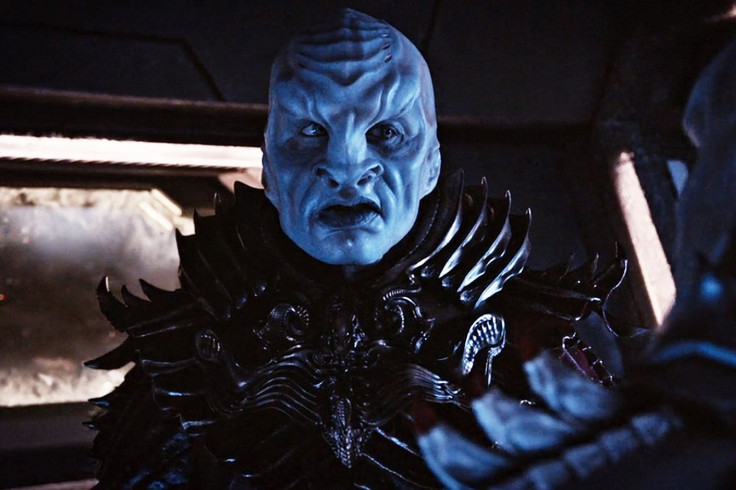Consider Westworld: layered with mysteries, revelations and multiple timelines, but nearly every twist was correctly guessed in advance. All that mind-blow, wasted on people who saw it coming. How is it that there are still TV writers who haven’t learned what Rick and Morty co-creator Dan Harmon has learned in the writers’ room for his own sci-fi series?
“You cannot write payoff-based TV anymore because the audience is essentially a render farm. They have an unlimited calculation capacity. There’s no writers’ room that can think more than 20 million people who can think about it for an hour a day.”
And yet they persist.
Star Trek: Discovery has at least two major plot twists on the backburner in its first season, both quickly predicted by virtually everyone. This isn’t just a problem for the plotting, or more evidence damning Discovery ’s misuse of serialized storytelling, but also for the new Star Trek’s main character: Michael Burnham.
The first twist we can expect in a future episode of Star Trek: Discovery is the reveal that Lieutenant Ash Tyler is actually a Klingon in disguise. For one, they’re both played by Shazad Latif. But the evidence goes deeper than that, to the point that this couldn’t justifiably be considered a mere fan theory. Tyler appeared right after Voq disappeared. L’Rell offered to connect Voq with the Klingon House of Mo’Kai, experts in espionage and spycraft. Tyler owes his arrival on Discovery to a suspiciously easy “escape” from Klingon captivity, aided by, once again, L’Rell.
Absent a twist-bluff, Tyler is Voq in disguise.
The second twist is less twist-y, but no less consequential for Star Trek: Discovery’s endgame (Season 1 will close the Klingon war arc). Gabriel Lorca is becoming paranoid, violent and increasingly prone to violating both the spirit and the letter of Starfleet regulations. He’s looking more and more like one of those cracked officers from Star Trek: The Original Series, especially Commodore Matt Decker, who took command of the Enterprise just so he could dive-bomb it right into the mouth of “The Doomsday Machine” and forced Spock to “mutiny” and relieve Decker of his command.
Lorca’s not there yet, but he will be. Lorca’s going to go nuts. And even more convincing than the phaser he keeps under his pillow or his willingness to doom Admiral Cornwell to Klingon torture is how much Burnham admires him. “I’m grateful to server under a captain like you,” she tells him at the end of “Lethe.” After an entire episode of Lorca acting like a conniving sociopath, it’s hard to miss the dramatic irony in Burnham’s admiration. We can be close to certain that she’ll be brought to a similar crisis point with Lorca as she was with Captain Georgiou, forced once again to choose between the chain of command and her own pragmatism.
And that’s the real problem with both these twists, not that they’re predictable (though they are), but that both hinge upon a dramatic irony we hold over Michael Burnham, Star Trek: Discovery ’s main character. We watch Burnham fall in love with Tyler, knowing he’s a Klingon spy. And we watch Burnham find her feet in Starfleet again, knowing she’ll have to make the same hard decision with this captain as the last one. And who knows, maybe those moments of crisis will be compelling — the dramatic highlight of some future episode. But for now, episode to episode, these ticking twists have only one effect: they make Michael Burnham look like a complete stooge.
It will be difficult to fully engage with Burnham as a character so long as we’re aware of massively consequential events that Burnham isn’t. Rather than a savvy participant in the ongoing war between the United Federation of Planets and the Klingons, Burnham becomes a tragic fool, buffeted by the events swirling around her that are known to us but not to her. It’s a sucky position for any protagonist.
Of course, it’s always possible events won’t play out in a way that makes Burnham doubly the dupe. Maybe the evidence for Tyler as Voq in disguise is intentionally obvious. Lorca could accuse Tyler of being a Klingon spy and Burnham could stand against him, eventually proving Tyler’s humanity. Or maybe Star Trek: Discovery, typically Trek utopian in so many other ways, really is reactionary enough to argue that Lorca’s correct to be such a vicious madman. Perhaps, like our own torturers and psychopaths, he’ll be rewarded.
But Star Trek: Discovery, like so many shows before it, probably thinks it’s being super tricksy by doling out tiny hints at mindblowing revelations; the writers failing to anticipate just how obvious they’ve made it. If Westworld, a far more complicated (though often stupid in its own way) show, couldn’t keep its surprises, Discovery never really had a chance. It’s just too bad that the ongoing burden of obvious twists, unfulfilled, does so much damage to a character we’re meant to respect.
- Richly redesigned Klingons
- Complex and explicable motives
- Great new Starfleet characters
- Incredible production design
- Generic space combat and action
- Too many flashbacks
- Eschews subtext, doesn't put enough faith in the audience



















